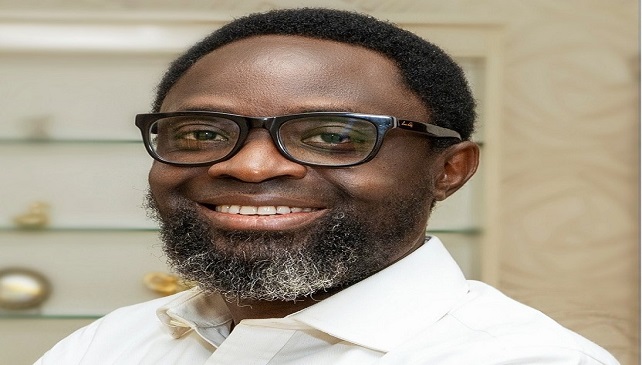News
Sub Saharan Africa’s ICT Industry Valued at $10Bn – Ramesh

In a continent of over billion people, the ICT market in Africa, excluding South Africa is valued at only USD 10 billion. South Africa’s ICT market is valued at over USD 22 billion.
The country alone accounts for about 68 percent of the entire market in Africa which makes the continent’s figures of USD 32 billion appear skewed.
This was revealed by Ramesh Awtaney, Founder and Chairman of iSON Group during his presentation on ‘’Bringing Intellectual Property to Work: Create Onshore Model, Target Offshore Opportunities’’, at the 2017 London Business School’s Africa Business Summit.
Ramesh examined the opportunities in Africa’s ICT sector in relation to India’s industry where ICT is playing a massive role.
According to him, ICT is the propelling factor in India’s 6.5 percent average annual GDP growth for past two decades and at present commands a 10% share of the country’s GDP.
Also 38 percent of India’s export are ICT services. In the USD 2 trillion economy, the sector rakes USD 100 billion of exports. The best case of ICT export in Africa is that of Kenya where contribution is 0.06 percent of GDP.
India has been on its ICT journey since the 1990s. Globally, the country represents 55 percent of the ICT offshore market.
The USD 100 billion ICT offshore industry has capitalized on the availability of educated youths. This was achieved through the engagement of all stakeholders through training. If the domestic market is included, the sector is worth USD 200 billion.
In 2015 approximately 230,000 new jobs were added in India’s ICT sector, while sector’s current overall employment figure remains well north of 10 million.
This feat was not achieved on the back of profound innovation or sudden breakthrough. It was a collective determination to get things done by government, academia, and industry experts as a means to fuel economic growth.
Ramesh is convinced that what India did in 25 years can be achieved by Africa within 5 -10 years if India’s model can be replicated.
Like India, all Africa requires is commitment to attain this height. The youth population of India in the age group 15-34, 400 million while Africa is comparable with 300 million youth.
The ICT sector requires only one material which is educated youth which Africa seems to have in abundance. Furthermore, in Africa not only English but French, German, Spanish and Arabic are also widely spoken.
In the 1990s and early 2000, offshore was the buzzword in India as jobs moved from Europe and America to India, whereby know how of processes became the intellectual properties. As economies begin to grow in Africa, there is a need to outsource non – core functions.
This can be achieved in two ways. Either one brings work to intellectual property or knowledge (intellectual property) to work.
The Indian model is that of former in which businesses from other countries bring the work to India. This is called work to intellectual property (IP). iSON, when it was founded 6 years ago in Africa, decided to do the latter.
Elaborating further, Ramesh revealed that iSON brought the knowledge from India to Africa instead of taking work from Africa to India.
Today, iSON has created over 10,000 jobs, having employed over 20,000 people since its inception Interestingly enough, to create these 10,000 jobs, USD 20 million has been invested. In no other industry can one make an impact of 20,000 jobs with 20 million dollars.
With these 20,000 well trained and skilled employees, the ‘’Knowledge Base’’ has been created and this would help propel the growth domestically.
According to him, what will help create the skills set for the real jobs in Africa is relevant education. In today’s Africa, about 80% – 90% of what is taught in schools is irrelevant. Schools’ curricula need to change.
The youth need to be served with relevant education. If schools collaborate with industries like ICT, they can be given specifications of new jobs that are going to be made available. Africa needs to change her curricula to include what is industry relevant. This, in turn, will create the jobs, create the skills that are required, and start an offshore industry.
The ICT growth we clamor for in Africa cannot be achieved by just going after the domestic requirements.
Also as the ICT industry matures in India, they like to take on more value addition jobs. Companies have grown and evolved in their circle, and aim to move up their billable from $20,000 per employee a year to $80,000 per employee a year. Indian companies are now looking to concentrate on big data analytics. These are the opportunities available for Africa to capture in the outsourcing space of basic IT and ITes.
Offshore requirements have to be a major target and in order to achieve that, good project management is required.
There has to be collaborations between the existing technology ecosystem, academics and key industry players. The government on the other hand, need to formulate policies which encourage offshoring to Africa much like India did in 1990s and early 2000.
News
New Study Reveals How Moniepoint Powers Nigeria’s Downstream Oil Sector with Same-Day Settlements and Working Capital Boost

In a move to strengthen Nigeria’s downstream oil and gas sector, Africa’s all-in-one financial platform for businesses and their customers, Moniepoint Inc. says it is transforming how petrol stations across the country manage payments, access credit, and track inventory through innovative financial solutions.

As the largest distribution network for financial services in Nigeria, the leading banking and payments platform trusted by million in its latest case study titled, “Fueling the Nation: How Moniepoint Powers Nigeria’s Oil and Gas Industry”, reaffirmed its commitment to providing digital payment solutions and business management tools to improve operational efficiency in Nigeria’s downstream sector.
The study released recently examined how petrol stations play a crucial role as vital distribution points for fuel in Nigeria, especially in areas with limited access to alternative energy sources. Over 90 per cent of passenger and freight movement in Nigeria is by road, literally fueled by petrol stations that facilitate an average of 41 to 47 million litres of petrol every day.
The downstream oil and gas sector has been considered as the lifeblood of the Nigerian economy, however, for decades, petrol station operators have grappled with the “T+1” settlement cycle, where funds from card payments are only accessible the next day. In an industry with razor-thin margins and the need for immediate restocking, this delay often leads to “dead tanks” and lost revenue.
According to the case study, Moniepoint has bridged this gap by introducing same-day settlements, ensuring that station owners can access their funds instantly to pay suppliers and keep pumps running. The report further reveals that 90.9% of petrol stations now utilize POS terminals as standard infrastructure, with digital channels accounting for 43% of all fuel payments nationwide.
The Moniepoint case study on Nigeria’s downstream oil and gas sector provides very insightful commentary on critical aspects of running a petrol station, including payment systems, inventory management, and funding challenges.
Giving insight into the report and its relevance to the nation’s energy segment, Managing Director, Moniepoint Microfinance Bank, Babatunde Olofin, noted that the study seeks to deepen policy engagement, provide actionable intelligence on critical success factors needed for the nation’s socio-economic growth across different verticals.
Olofin noted, “We are pleased to release this comprehensive report on Nigeria’s downstream sector. Moniepoint’s reason for being is to create financial happiness and power dreams. Reports like this move us in that direction, enabling us to support critical infrastructure that keeps the nation moving.
“Looking at the relevance, with data on their business transactions and our business management tools, petrol stations can effectively plan their inventory and availability, knowing exactly when to stock up and ensuring operations run smoothly to serve more customers.
“By providing fuel retailers with the financial tools they need, Moniepoint is creating a future where access to reliable fuel distribution is improved and represents more than a fundamental right for all in an equitable and efficient system.”
Some other Key insights from the report include: The Liquidity Gap: 1-in-3 station owners identify access to credit as their biggest recurring challenge.
Credit Success: Moniepoint has disbursed millions of Naira in working capital to the sector with a 99.81% repayment success rate.
These tools have enabled nearly three in five fuel stations nationwide to transition from cash-dependent, manually-operated businesses into digitally-enabled enterprises with reliable access to both payments’ infrastructure and growth capital.
This study by Moniepoint comes on the heels of others like the previous case studies on family-owned businesses, South-East’s Onitsha Market, community pharmacies, women-owned businesses, North-East agriculture and the definitive Informal Economy Report, which collectively demonstrated how digital payment solutions are transforming Nigeria’s commercial landscape across diverse sectors and market structures.
Moniepoint’s ongoing commitment to financial inclusion and economic development has positioned it as a catalyst for growth across Nigeria and beyond. The company processes billions in transactions monthly and continues to expand its reach, supporting millions of businesses with payments, banking, credit, and business management solutions.
News
FG Mandates Shared Funding for N1.98trn Electricity Subsidy

Federal Government has directed state governments to begin sharing the cost of electricity subsidy alongside the Federal Government.

It was gathered that payments for the subsidy will now be funded through the Power Assistance Consumers Fund (PCAF), a government-backed pool created to subsidise electricity bills for low-income and vulnerable consumers.
The fund is designed to replace blanket subsidies with targeted support, improve affordability amid rising tariffs and stabilise the power sector.
More than 18 states are already operating electricity regulatory agencies, while others are preparing to do so. The states include Lagos, Ondo, Osun, Ekiti, Edo, Delta, Bayelsa, Akwa Ibom, Cross River, Abia, Anambra, Imo, Kogi, Niger, Nasarawa, Plateau, Gombe and Jigawa.
The Director-General of the Budget Office of the Federation, Mr. Tanimu Yakubu, disclosed this in Abuja at the opening of the 2026 Post-Budget Preparation workshop on the Government Integrated Financial Management Information System (GIFMIS).
Speaking in an address read on his behalf by the Director of Expenditure Social, Mr. Yusuf Muhammed, Yakubu said states that enjoy the political benefits of electricity subsidy must also contribute to covering the financial gap created by the policy.
“Mr. President has directed that we operationalise a clearer framework to share the cost of electricity across the federation, so the burden is not treated as an open-ended fiscal residual — I mean federal residual,” he said.
“If you want a stable power sector, we must pay for the choices we make. When tariffs are held low, a gap is created. That gap is a subsidy, and a subsidy is a bill.”
He added: “In 2026, we will stop pretending that this bill can be left to the Federal Government alone, especially where the policy choice or the political benefit is shared across tiers of government.”
According to him, the President has ordered the activation of the electricity sector’s legal framework to ensure subsidy burden-sharing is practical and transparent.
“This means subsidy costs must be explicit, tracked and funded, so they do not return as arrears, liquidity crises or hidden liabilities in the market,” Yakubu said.
“It also means that if any tier of government chooses affordability intervention, the responsibility must be clear, agreed and enforceable. This is not punishment. It is an alignment.”
He further warned MDAs to make subsidy-related costs visible in their planning.
“The implication is simple: make subsidy-related costs visible in your planning and submissions. Do not push liabilities into the market as arrears or unfunded commitments,” he said.
Yakubu also disclosed that President Bola Tinubu has directed a review of Nigeria’s Fiscal Responsibility Framework to make fiscal rules more dynamic and enforceable.
“Fiscal rules are not a slogan; they are the guardrails of government,” he said.
“Without guardrails, spending becomes impulsive, debt becomes casual, and the budget becomes a statement of intent rather than a tool of delivery.”
He added that capital projects in 2026 must be delivery-ready and properly financed.
“A long list of projects is not a development strategy. It is often a map of disappointment. What citizens feel is delivery, completed roads, reliable power, functional schools and working hospitals,” Yakubu said.
Reacting to the development, the Director of Media and Communications of the Nigerian Governors’ Forum, Mr. Yunusa Abdullahi, said: “We are reviewing the context and content of the information. We will not be making further comments on it.”
News
Spain Bars Under-16s from Social Media in Digital Safety Crackdown

Spanish Prime Minister Pedro Sánchez has unveiled plans to ban children under 16 from social media platforms, mandating robust age verification systems as part of a sweeping legislative package to curb toxic online content.

Speaking at the World Government Summit in Dubai, Sánchez declared platforms must erect “real barriers that work” beyond mere checkboxes, shielding minors from the “digital Wild West” where they navigate unprotected.
The proposal, set for approval by Spain’s Council of Ministers next week, amends a draft bill in parliament and holds social media executives legally accountable for illegal content like disinformation, hate speech and child pornography.
The measures introduce tools to track harmful material spread, while criminalising algorithm manipulation that amplifies such content for profit.
“Spreading hate must come at a legal, economic and ethical cost platforms can no longer ignore,” Sánchez emphasised, vowing governments would stop turning a blind eye.
Spain joins Europe’s hardening stance on youth online access, mirroring Denmark’s under-15 ban plans from last fall, France’s push for restrictions by September, and Portugal’s new bill requiring parental consent for under-16s.
The moves signal a continental shift to “regain control” of digital spaces amid rising concerns over youth vulnerability.

 Telecom3 days ago
Telecom3 days agoTelecom Operators Invest Over $1Bn on 2,850 New Sites in 2025 – NCC

 E-Financial3 days ago
E-Financial3 days agoIf Capital is the Answer, What Exactly is the Problem with First Holdco

 E-Financial3 days ago
E-Financial3 days agoAmaanah Finance to Unveils Non-Interest Banking Services Today

 News3 days ago
News3 days agoNSCDC Hands over Fake Crypto Currency Trader to EFCC

 E-Financial2 days ago
E-Financial2 days agoAccidental Billionaire Opts for Jail Instead of Returning Money Credited Him by Mistake

 General News3 days ago
General News3 days agoFirst Trustees to Host 8th Islamic Estate Planning Clinic in Abuja

 News3 days ago
News3 days agoAlakija’s Flourish Africa Provides N300m Grants for Women Entrepreneurs

 News2 days ago
News2 days agoUS Set to Deport 79 Nigerians on Criminal List















